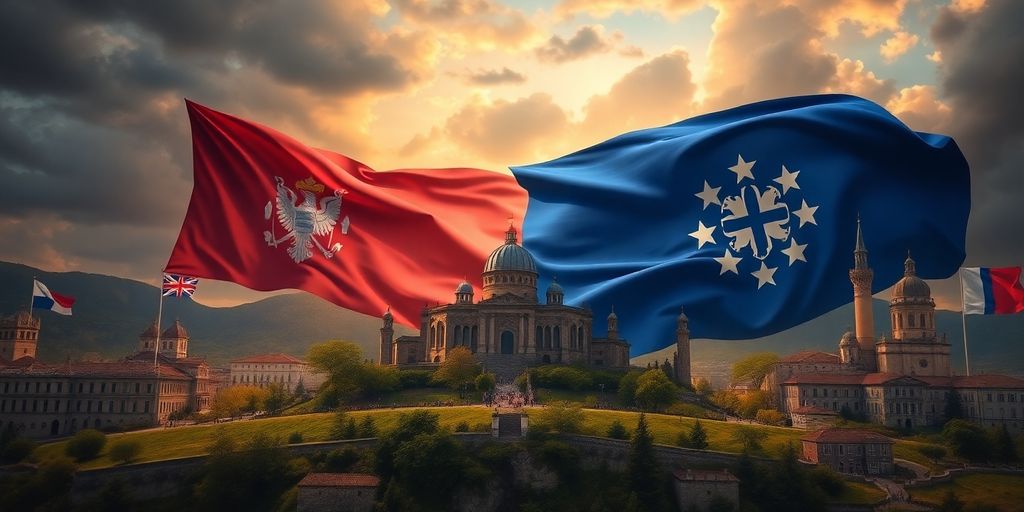In a dramatic escalation of political tensions, Bosnia and Herzegovina is facing a significant crisis as Milorad Dodik, the president of the Republika Srpska entity, pushes for separatist policies that threaten the fragile peace established after the Bosnian War. His recent actions have sparked widespread condemnation and raised fears of renewed instability in the region.
Key Takeaways
- Milorad Dodik has called for ethnic Serbs to withdraw from federal institutions, escalating separatist rhetoric.
- Bosnia’s Constitutional Court has suspended controversial laws rejecting federal authority in Republika Srpska.
- The High Representative has cut off public funding to Dodik’s party, signaling international disapproval.
- NATO reaffirms its commitment to Bosnia’s stability amid rising tensions.
Dodik’s Separatist Agenda
Milorad Dodik has long been a controversial figure in Bosnia, known for his hardline stance on Serb nationalism. Recently, he has intensified calls for the Republika Srpska to distance itself from Bosnia’s federal institutions, urging ethnic Serbs to abandon the federal police and judiciary. This move is seen as a direct challenge to the authority of the central government and a step towards potential secession.
Dodik’s rhetoric includes inflammatory statements that dehumanize the Bosniak population, echoing sentiments from the dark days of the 1990s conflict. His comments have drawn parallels to past leaders who incited ethnic divisions, raising alarms about the potential for violence.
Legal and Political Repercussions
In response to Dodik’s actions, Bosnia’s Constitutional Court has suspended laws that would allow the Republika Srpska to reject federal authority. This decision comes after Dodik was convicted for defying the authority of the High Representative, Christian Schmidt, who oversees the implementation of the Dayton Peace Agreement.
- Key Legal Developments:
- Suspension of Laws: The Constitutional Court temporarily suspended Dodik’s laws that defy federal authority.
- Conviction: Dodik received a one-year prison sentence and a six-year ban from office for his defiance.
- Funding Cut: The High Representative has cut off public funding to Dodik’s party, emphasizing that actions have consequences.
International Response
The international community has reacted strongly to the escalating crisis. NATO has reaffirmed its commitment to Bosnia’s territorial integrity and stability, emphasizing the importance of adhering to the Dayton Peace Agreement. The organization has expressed concern over the implications of Dodik’s actions for Bosnia’s constitutional order and the functionality of its state institutions.
- NATO’s Position:
- Commitment to stability in Bosnia and Herzegovina.
- Support for the Dayton Peace Agreement as a cornerstone of peace.
- Collaboration with international partners to prevent a security vacuum.
Conclusion
As Bosnia navigates this precarious political landscape, the actions of Milorad Dodik and the responses from both domestic and international actors will be crucial in determining the future of the country. The potential for renewed ethnic tensions looms large, and the international community remains vigilant in its efforts to uphold peace and stability in the region.
Sources
- Dehumanisation as Strategy: Bosnian Serb Leader Dodik’s Rhetorical Warfare, Balkan Insight.
- Bosnia’s top court suspends Serb statelet’s controversial laws, Courthouse News.
- Bosnia’s International Envoy Cuts Off Public Funding to Dodik’s Party, Balkan Insight.
- News: NATO reaffirms its steadfast commitment to security in Bosnia and Herzegovina and to
safeguarding the Dayton Peace Agreement, 15-Apr.-2025, NATO – Homepage. - Tensions rise in Bosnia after reports of failed arrest attempt of Serb separatist leader, AP News.






